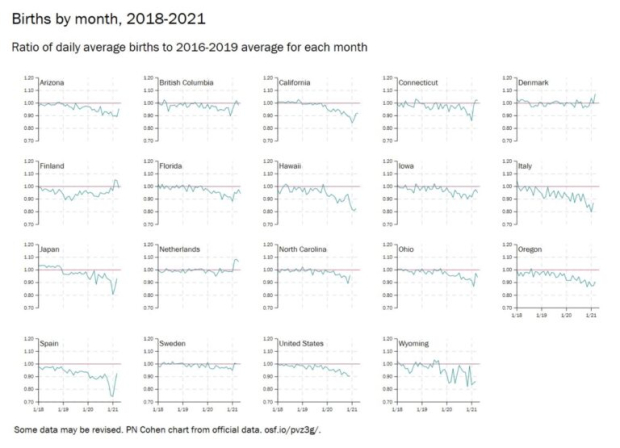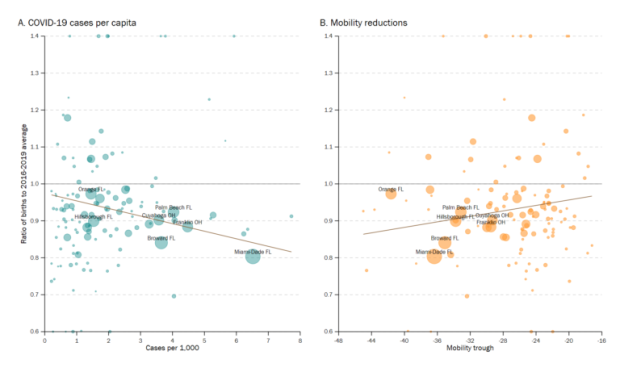Early in the pandemic, people started speculating about potential effects on birth rates. I started talking about news and research that asked the question, “Will coronavirus cause a baby boom, or is that just a myth?” At the time, I ended with a not-so-satisfying “we’ll know in about 9 months.”
Now we know a little more and it’s worth revisiting and updating.
I originally talked about the fallacy of the one-sided bet in describing the question of whether the effect of the pandemic on birthrates would be positive or zero, without considering the possibility of a negative effect. Arguments for why we might expect a decline rather than a boom or even a positive blip were made, and now data are coming in.
The possibility of a decline was my conclusion after reading an April 2020 news article by Marie Puente. As I described in my original post, the article interviews 6 experts, of whom 3 thought there would be fewer babies, 2 expected to see about the same, and 1 who expected a slight increase. But (a) the article led with the one expert whose view is different from all the others, and then (b) presented the second expert as in agreement with the first, even though they are not in agreement! So, the article had a lot of good aspects, but it seems to me that it was slanted toward a particular story—there will be a baby blip, but it will be a small blip—even though the expert consensus seemed to be that the number of births would actually decline, not rise. Indeed, looking carefully, it seems to me that the scholars cited in the article who are the most experts in the area are Philip Cohen and Stephanie Coontz, both of whom expected a decline in births.
So the real story should not be: There might be a little baby boom, but just a blip. Rather, it should be: We can expect a reduction in the number of births.
Here are new data plotted by Philip Cohen (posted on Twitter on June 3, 2021) and what he wrote at the end of January 2021:

One thing we don’t yet know is how much of [the change in California] is driven by people moving around, rather than just changes in birth rates. California in 2019 had more people leaving the state (before the pandemic) than before, and presumably there have been essentially no international immigrants in 2020. Hawaii also has some ‘birth tourism’, which probably didn’t happen in 2020, and has had a bad year for tourism generally. . . .From the few non-US places that I am getting monthly data so far, the trend is not so dramatic.
In March, he followed up with this figure and analysis of data by county in Florida and California:

The United States experienced a 3.8 percent decline in births for 2020 compared with 2019, but the rate of decline was much faster at the end of the year (8 percent in December), suggesting dramatic early effects of the COVID-19 pandemic, which began affecting social life in late March 2020. . . . The United States experienced a 3.8 percent decline in births for 2020 compared with 2019, but the rate of decline was much faster at the end of the year (8 percent in December), suggesting dramatic early effects of the COVID-19 pandemic, which began affecting social life in late March 2020. . . . births fell almost everywhere (87% of the population lives in a fertility-falling county), so it didn’t take a high case count or shutdown to produce the effect.
I find all of this interesting for its own sake—whether and when we have babies is a big deal!—and also because it illustrates the challenges of communicating uncertainty. The story started with a speculation of a pandemic baby boom, a theory which was immediately quashed by experts but still made its way into the news. But the data-based follow-up the year later was also a challenge to report: yes, there was a decline in births during the pandemic, but it was a continuation and intensification of an existing downward trend. Perhaps the lesson is to not expect simple patterns in the first place.





